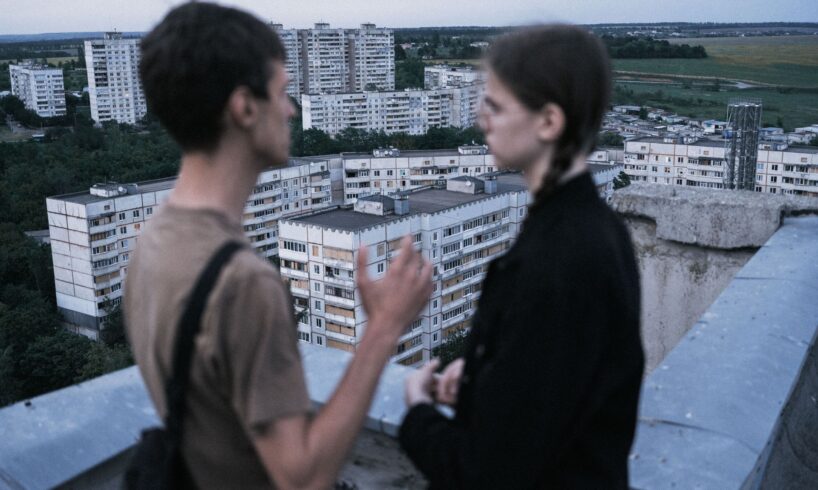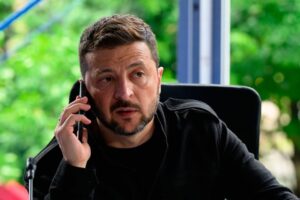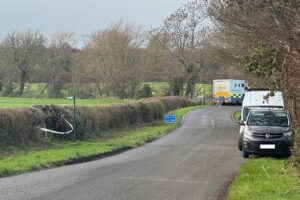
Illia, 17, talks with his friend Nastia on the rooftop of a damaged 16-story building in Kharkiv, Ukraine, on May 27, 2025. (George Ivanchenko / The Kyiv Independent)
Russia’s war has struck Ukrainian teens in a uniquely cruel way — already navigating the turbulence of adolescence, they also face the emotional and psychological scars the war continues to leave on them.
Like teenagers everywhere, they juggle high school, brace for pivotal final exams, search for their identity, and worry about what the future holds.
But in Ukraine, the pressure of final exams pales in comparison to the trauma many of them carry — the loss of homes, loved ones, classmates, a sense of normalcy. For many teenagers in Ukraine, school has been reduced to inconsistent and often ineffective online classes. Their values are shaped not by textbooks or their social lives, but through the brutal lessons of daily Russian attacks, brushes with mortality, and the wrenching choice of patriotism or leaving Ukraine for a safer life.
To get a glimpse at how the Russian invasion has affected Ukrainian teenagers, the Kyiv Independent asked teens in Ukraine aged between 14 and 17 about their daily lives and experiences during the war.
Among them: a 14-year-old enduring her teenage years in isolation from online classes and a struggle with depression; a 17-year-old drone instructor teaching soldiers to fight Russians while estranged from his pro-Russian father; and a 17-year-old who’s lost both her mother and home to Russia’s war.
Editor’s note: These first-person narratives have been adapted from transcripts of interviews by the Kyiv Independent. They have been edited for length and clarity and translated into English from Ukrainian, but all of the words are from those we interviewed. In accordance with the Kyiv Independent’s editorial policy, we are not publishing the teenagers’ last names.
Polina, 14, Lozova, Kharkiv Oblast:
‘Adult life is terrifying’
Polina can barely recall what a normal school life feels like. First came the COVID-19 pandemic, then Russia’s invasion — forcing her into years of online learning after a missile strike destroyed her school in northeastern Kharkiv Oblast.
Bullied by some of her classmates and cut off from meaningful social interaction in her small town, Polina says she gradually withdrew into isolation. She now spends most of her time alone — in her room or on solitary walks — grappling with mental health struggles and the uncertainty of a future shaped by war.
I remember sitting in the cellar during one attack in the first year of the full-scale war, crying and telling my mom that I didn’t want to die. Now I just stay in my bed.
In September 2022, a Russian missile hit our school. We have been studying online ever since.
I started hanging out with a group of my classmates in 2023. Then, they started treating me differently. I was bullied. They photoshopped some obscene photos of me to spread around the class and insulted me. Everyone believed their gossip and didn’t want to talk to me. I stopped talking to them, but I’m still upset.
Polina, 14, in her bedroom in Lozova, Kharkiv Oblast, Ukraine, in an undated photo. (Dzvinka Pinchuk / The Kyiv Independent)
Before our school was destroyed, I was at least in an online chat (with my classmates). I could talk to them. And then I was just kicked out of there, and that was it.
I don’t like studying online. If we had studied in person, I think I would have done better with my studies. Teachers don’t take extra time with their students anymore. Before, you could stay after school and ask teachers to explain things.
I’m worried about my future. I am very scared of our final exam. It seems that my whole life will depend on it.
I often cry uncontrollably. I can’t sleep at night.
I spend 80% of my time at home, in my room. I asked to put a lock on my door, but my mom said no.
I watch some videos, draw, or play something (on my guitar). Or I just lie in bed, watching TikTok. I like to watch some guitar and music videos.
This spring, I’ve started wandering around by myself. It’s so cool. You walk around, listen to music. You think about things, and you get lost in thought. I’m perfectly happy to take walks alone.
Sometimes I remember all the (bullying), and it really overwhelms me. I shouldn’t get nervous at all, because I’ve been suffering from nervous psoriasis since I was seven, when my father passed away. And nerves complicate my condition a lot.
Polina, 14, stands on the ruins of her school, which was bombed by Russian forces in 2022 in Lozova, Kharkiv Oblast, Ukraine, on April 24, 2025. (Dzvinka Pinchuk / The Kyiv Independent)
There are moments when even a spoon dropped on the floor can upset me, and I can cry for hours. I often cry uncontrollably. I can’t sleep at night.
If it weren’t for the full-scale war, I think everything would be better — my life, my mental state, and maybe even my relationship with my mom, because she worries so much about everything.
First, I tried to follow the news somehow, but then I deleted all those channels and subscriptions. Now I don’t read the news at all. When you just live your life, don’t read anything, everything feels fine.
I’m about to turn 15. I can’t believe that I’ll be 16 next year. Adult life seems so terrifying.
Illia, 17, Kharkiv:
‘I felt I was contributing to history’
Illia’s family lived its entire life in Kharkiv, a northeastern city close to the Russian border. On the morning of Feb. 24, 2022, they retreated to their country house located outside the city to shelter from the intense Russian bombardment. Within hours, the area fell under Russian occupation.
After their neighbor was killed by shelling, the family fled, crossing through Russia before making their way back to Ukraine via several European countries.
Once home in Kharkiv, 14-year-old Illia found a renewed sense of purpose within a patriotic community and a right-wing youth organization. He organized rallies, volunteered to support the Ukrainian army, and underwent various military-style trainings.
Last year, he moved out of his parents’ home to live alone. He left the organization and currently works as a drone instructor for Ukrainian soldiers.
Illia, 17, a Mavic drone instructor, rubs his eyes as he conducts training for the military at a training ground in Kharkiv, Ukraine, on May 27, 2025. (George Ivanchenko / The Kyiv Independent)
My father is actively pro-Russian. In my childhood, I heard stories about how wonderful it was in Russia. I even rebelled against learning Ukrainian at school.
And when I was 12, I got interested in history and joined an online history chat about World War II. I began to look at the situation differently and somehow became (patriotic).
I first joined the “Tradition and Order” organization at 13 in May 2021. I joined their free gym with a friend. Most of the young people from “Tradition” mobilized into the army in 2022, and for a while, there was no movement.
In January 2023, I joined the organization “Right Youth,” the youth branch of the “Right Sector.”
I wouldn’t say that I was a nationalist at that time; I was just interested. I looked up to the head of the organization, senior brothers, fighters of the Ukrainian Volunteer Corps, and the military.
After six months in the organization, I was elected the next head of the Kharkiv branch.
Illia (C), 17, a Mavic drone instructor, conducts training for the military at a training ground in Kharkiv, Ukraine, on May 27, 2025. (George Ivanchenko / The Kyiv Independent)
I made a ton of connections and had a lot of interesting experiences. We had events every day. We used to make (camouflage) nets for the military and held fundraisers for first-person-view drones for our fighters. We had mixed combat training, which included practicing punches, sparring, and general physical training, and went to a tactical or medical school. We had topography, ground orienteering, and target practice. I really liked that.
My parents are afraid that there could be bombings at my work.
We placed a strong emphasis on discipline and ideology. Our age range was from 15-16 to 20 years old, max. Sometimes there were exceptions, but it was young people leading young people.
In November 2024, friends from other organizations offered me a job as an instructor at a drone school. I agreed, passed the training, and started working six months ago.
Illia (R), 17, a Mavic drone instructor, watches the drone as he conducts training for the military at a training ground in Kharkiv, Ukraine, on May 27, 2025. (George Ivanchenko / The Kyiv Independent)
My parents are afraid that there could be bombings at my work. My father’s position (on Russia) has not changed much. That’s also why I moved out. If this topic comes up, my father and I will argue endlessly. These days, we hardly see each other.
Our former students regularly send us videos of how they drop bombs on Russians or intercept enemy drones from the entire Kharkiv area. There’s definitely a certain pleasure I take in being part of the process of killing enemies.
I left the organization last January for reasons that remain between me and its chief. I regret it now.
I haven’t given up volunteering; I teach the military. But I don’t feel like I have a global impact on anything.
When I was in the organization, I felt that I was, if not changing things, at least contributing something to history. I want to make a big, global contribution again.
Illia, 17, and his friend Nastia talk and look out over the area from a damaged apartment building in Northern Saltivka in Kharkiv, Ukraine, on May 27, 2025. In the background is the school where Illia once studied, now reconstructed. Before Russia’s full-scale invasion, he lived in this neighborhood with his family. (George Ivanchenko / The Kyiv Independent)
About a month ago, our friend Vindir, the chief of the Kyiv branch of the organization, was killed fighting. He was 18. I still can’t believe he’s gone — he was far too young to die.
Many of my classmates, mostly boys, went abroad. They always said that life in Ukraine was “hopeless, with no future.” I just don’t see it the same way they do. Ukraine has more options for me and a better future.
Sofia, 17, Kharkiv, previously Vovchansk:
‘We lost our life’
Everything changed in an instant for Sofia and her family when Russia invaded and occupied their hometown of Vovchansk, located near Ukraine’s northern city of Kharkiv.
Trapped with no way to escape, Sofia’s bedridden mother was cut off from the lifesaving treatment she depended on. Although Ukrainian forces eventually liberated the area in 2022, it was too late to save her.
After burying her mother in Vovchansk, the family fled. The town was later devastated during Russia’s renewed offensive in Kharkiv Oblast in 2024. Sofia and her three younger siblings now live with their grandmother in Kharkiv.
For me, the war is mainly about loss.
My mom’s disease, multiple sclerosis, required constant treatment. Before the invasion, she stayed in the hospital, undergoing different procedures. It was getting better for a while. But she needed constant treatment, and with the road to Kharkiv (from our town) blocked, we could no longer get her the help she needed.
Sofia, 17, studies online at her home in Kharkiv, Ukraine, on May 28, 2025. (George Ivanchenko / The Kyiv Independent)
We didn’t leave the house in the first days. When my grandmother and older sister went to the market to find out something, Russian flags and checkpoints were everywhere. We were under occupation from February to September 2022.
There was no treatment for my mom after our stocks ran out. There were no supplies for a month or two. Then they started bringing medicines from Russia.
As my mom was constantly in bed, she began to develop bedsores. We treated her with whatever we could. It got worse and worse.
It is impossible to forget liberation. My grandma came home and said, “There are no checkpoints.” Then someone said that our guys were on their way. People came with flags, crying…
It’s not our fault that (Russians) came to our home.
Someone (in Kharkiv) told me that since we (stayed under occupation), we were, as they call us, “zhduny.” (Editor’s note: The word “zhduny,” meaning “those who wait” or “the waiters” in Russian, is a pejorative term for those who were “awaiting” the arrival of Russian troops in Ukraine.) That we were waiting for the “Russian world,” that we liked living (under occupation).
But some people have no choice. What were we supposed to do? Leave our sick mother there and go out by the roundabout ways? We could only move her in a special car.
Sofia, 17, and her younger brother Yehor, 16, attend an online biology class in their apartment in Kharkiv, Ukraine, on May 28, 2025. Both are in the 10th grade. (George Ivanchenko / The Kyiv Independent)Sofia, 17, shows her geometry notebook at her home in Kharkiv, Ukraine, on May 28, 2025. (George Ivanchenko / The Kyiv Independent)
It’s not our fault that (Russians) came to our home. Why did I have to abandon my home and go somewhere else? I was born there, grew up, studied, and had friends there.
The disease my mom had causes a person to slowly forget the life they’re living. At some point, they think they are a child. At first, she remembered and talked to us. Then she stopped recognizing us.
Her illness progressed very quickly. Then she died. She is buried in Vovchansk.
Nothing kept us there after her death, so we left. We left our whole life there.
I have been stuttering since birth. It got worse because of these bombardments. When we moved to Kharkiv, I started working with a speech therapist. Now I seem to speak normally.
Of course, there are attacks in Kharkiv, too, but life still goes on as usual.
Sometimes I get nostalgic and just want to go home. Everything is yours there — every centimeter, every potato in the garden. Everything was much simpler there.
Sofia (C), 17, her older sister Daria (L) with her newborn son Matviy, their grandmother Lidia (R), and their younger brother Rostyk gather in the kitchen of their apartment in Kharkiv, Ukraine, on May 28, 2025. The family relocated to Kharkiv from Vovchansk following the death of the children’s mother and ongoing Russian attacks. (George Ivanchenko / The Kyiv Independent)
Unfortunately, we no longer have a home. It was destroyed after we left in July 2023, first partially and then completely in August 2023. I keep telling myself it’s for the best that we weren’t there when it collapsed.
Everything there is mined and broken. We don’t even know if the cemetery is still standing. Not only is my mom buried in Vovchansk, but my grandpa, too. Even when the war is over, we won’t have a home to return to.
Volodymyr, 16, Khodoriv (Lviv Oblast):
‘The full-scale war was a powerful push for me to start moving’
Before Russia invaded, Volodymyr says he knew little about himself — for instance, that he was an extrovert and determined to achieve a better future for himself and his country.
He started attending small youth gatherings to socialize with internally displaced teens in his town. That led him to join the local youth organization and gradually develop into an ambitious project manager who’s passionate about socially important causes.
Now, Volodymyr is a key figure in his youth organization, the president of his school, and the deputy head of the Khodoriv community’s youth council. For him, it’s important to stand firm against the lingering Soviet mentality he sees in some people where he lives.
(The youth organization) “Molodiye” was supposed to be a social integration program for internally displaced people. I had few friends, so I started going every week. I acquired many skills there, including project management, applying for grants, and writing proposals.
Volodymyr, 16, at the youth organization “Molodiye”, which he leads, in Khodoriv, Lviv Oblast, Ukraine, on May 31, 2025. (Soliar Sofiia / The Kyiv Independent)
When I joined “Molodiye,” we had a lot of issues with some people in the (Khodoriv) community. Many children and some teachers at my school treat me very positively, and I was elected the school’s president. But there was a lot of hostility from other teachers, and rumors that “Molodiye” was a sect.
We’ve just won a grant of Hr 120,000 ($2,869) to implement our environmental project. One teacher asked what on earth we thought we were doing, as it would be better to put asphalt around the school.
I want to live my life here because my history, my roots are here. I want to do something for this country.
I think that the teachers who were in the Soviet Union have an idea that a child is small, inexperienced, and “does not have the right to tell me anything.”
I started speaking up to teachers who say things like that. Moments like those actually give me more motivation and confidence — they remind me that my voice matters, that I can make an impact.
You should never expect support from the community. You might be out there helping people, but don’t count on a “thank you” — most of the time, it won’t come.
I believe the main problem is that we don’t approach our citizenship with enough awareness. The state is the result of our collective work and efforts. If everyone were actively engaged and felt they could make an impact, things might look completely different.
I have always been a patriot, and I still am. I want to live my life here because my history, my roots are here. I want to do something for this country.
My dream is to major in political science. I plan to apply for a scholarship to study in the U.S., so I can bring that education back to Ukraine and build strong opportunities for growth here.
A wall inside the “Molodiye” youth space displays snapshots from events organized by Volodymyr and his peers in Khodoriv, Lviv Oblast, Ukraine, on May 31, 2025. (Soliar Sofiia / The Kyiv Independent)Volodymyr with his mother at their home in Khodoriv, Lviv Oblast, Ukraine, on May 31, 2025. She has supported his involvement in youth activism since the early days of “Molodiye”. (Soliar Sofiia / The Kyiv Independent)
My family and relatives, which is more than 20 people, say I’m doing a great job. It’s sad that everyone moved away, and now (me and my immediate family) are almost the only ones left in Khodoriv.
I also have relatives in Russia, and they still text us, “We feel so sorry for you, you’re under the Banderites (nationalists). Come to us, we want to save you.” These people sincerely believe that they are helping us when they come here killing us.
It is sad that these people believe in propaganda. We are also at risk (in Ukraine); we have to develop our critical thinking and not fall for it.
I understand exactly who is right and who is wrong in this war. Everything is clear to me: Russia is the aggressor, and we are defending ourselves.
The full-scale invasion was a powerful push for me to start moving somewhere. Without it, my life would have probably consisted of school, homework, and TikTok. I realized that I had to make an impact.
Taisiia, 15, Sumy:
‘I want to live my teenage life as much as possible’
Like many regular 15-year-olds around the world, Taisiia loves going out with friends, doing her makeup like American pop singer Sabrina Carpenter, and shopping for oversized fits à la singer Billie Eilish.
But the vignette of war activities — checking the news every morning and sheltering from regular Shahed drone attacks in her northern city of Sumy near the border with Russia — takes a toll on teenage life. Despite the war, Taisiia tries to live normally and make memories with her friends.
My morning starts with checking the news on Telegram. I find myself wondering what it would be like if I were one of those people injured (in Russia’s attacks). It gives me the chills.
The last bombing in Sumy (that killed 34 people on April 13) hit my theater, where I used to study. It was my second home. I wanted to help clear away all the rubble, but my mom wouldn’t let me go.
The two months of spring in 2024 when we went to school offline are the best memories of my life. That’s how I found my group of friends, my like-minded people.
Taisiia, 15, from Sumy, Ukraine, puts on her makeup on June 14, 2025. (Artem Komendant / The Kyiv Independent)
My mom doesn’t allow me to go to the city center after the last bombing, so we only hang out around the neighborhood.
I’m not afraid of death or pain. I’m more afraid of the sounds of explosions.
The attacks come in periods, in waves. It is very disturbing when it is calm. When the frequent attacks started, I got used to hearing Shaheds every night. When I don’t hear anything in the evening, it’s strange.
If we are walking with friends and see a Shahed flying, we run either to an entrance or a store. Sometimes we just keep walking. It’s a normal thing, happened many times.
When something is hit (in an attack), I’m sad for a whole week. I’m a positive person, but at such moments I just can’t be cheerful.
My boyfriend and his friend really want to go (to the army) in the future, but I don’t like it. A lot of lives are lost there. When there’s a bombing, the next day they always go to clear the rubble. It makes me very proud to have such friends.
I’m afraid to dress nicely. It seems that if I dress very nicely just to go for a walk, I will be judged. But I’m just a girl, I want to look beautiful.
Say, you’re just walking around, a Shahed is flying, and you’re wearing a dress and beautiful makeup. It’s uncomfortable. While soldiers are out there risking their lives to protect you, you’re just having fun.
Taisiia (C), 15, and her parents in Sumy, Ukraine, on June 14, 2025. (Artem Komendant / The Kyiv Independent)
But on the other hand, isn’t that exactly what they’re fighting for? What if I end up just sitting in a corner, doing nothing to make my life worth remembering?
I want to live my teenage life as much as possible as a real teenager. No matter how hard it is, I try to make sure that I have at least something to remember in the future, besides the war. But, of course, I will never forget the moments from the war.
I’m not afraid of death or pain. I’m more afraid of the sounds of explosions. It sounds very scary when you hear an airplane overhead as you walk on the street, it makes you crouch down.
But you just have to accept it. If it is my fate to die in such circumstances, then I cannot escape it.
Note from the author:
Hi, this is Natalia Yermak. I wrote this story for you. One of the best parts of my work as a reporter is the privilege to meet such inspiring people as teenagers featured in this article, and bring striking human stories to readers.
The Kyiv Independent is free for everyone to read. We are able to work thanks to a community of over 20,000 people who contribute $5 or more per month. If you’d like to support us, please consider becoming our member.
Growing up under missiles — Ukrainian childhoods shaped by war (Photos)
Ukrainian children are growing up in a world entirely reshaped by Russia’s war. Sirens, blackouts, and bomb shelters are nothing extraordinary — but a part of everyday childhood. This photo story follows five families as they raise their children in the shadow of the ongoing invasion. It’s not about the battlefield, but of bedrooms with windows shattered by blasts, morning routines interrupted by air raid alerts, and games played in underground shelters. The war seeps into the smallest moments.





